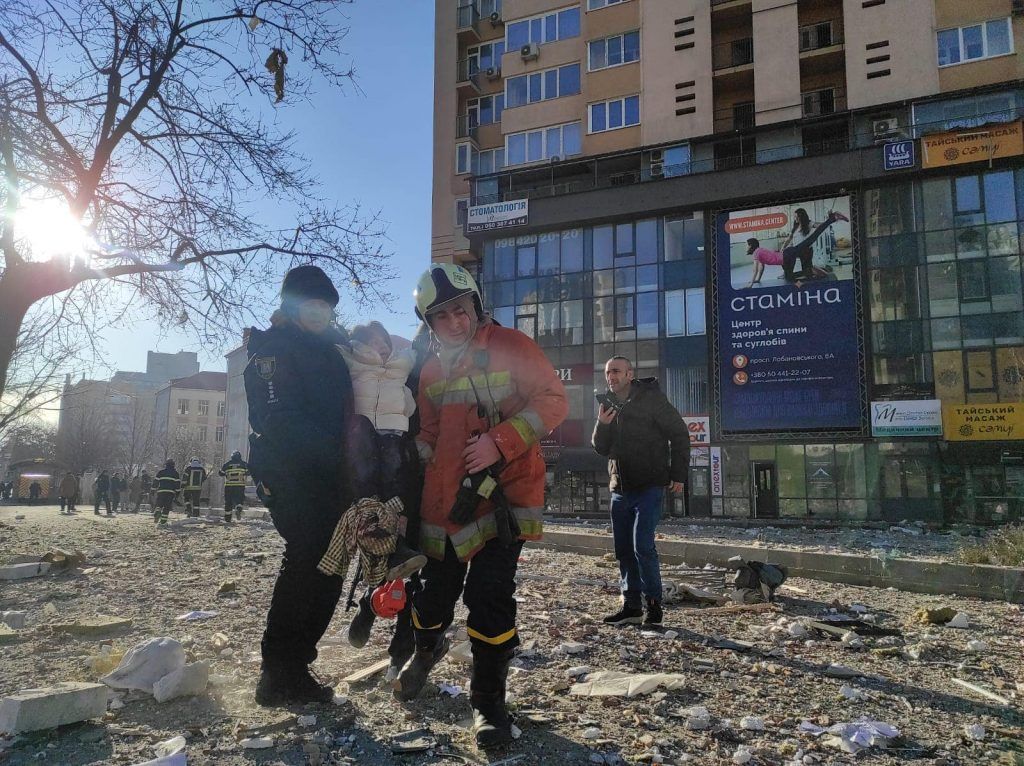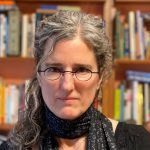Day 7: Russia pummels Ukraine as a key city falls; Ukrainians mount “creative” resistance; UN censures Russia
By Susan D’Agostino | March 2, 2022
 People survey destruction in Ukraine on a recent day. Credit: Ukraine Ministry of Internal Affairs
People survey destruction in Ukraine on a recent day. Credit: Ukraine Ministry of Internal Affairs
Russia’s all-out assault on Ukraine entered its seventh day, with its first major seizure of a city—Kherson, with a population of approximately 300,000 people—today. Earlier this week, the Russian military appeared to pivot its strategy to aerial bombardment and encirclement of key Ukrainian cities. Laying siege to a city traps residents and allows for the possibility of cutting access to supplies. The air attacks have targeted residential areas, schools, hospitals, and government buildings, raising prospects for a dramatic increase in potential loss of civilian lives.
Still, the Ukrainian resistance, which includes many citizens and volunteers, has slowed Russia’s invasion, according to the US Defense Department. In a Defense publication called DOD News, a senior defense official was quoted as saying that Ukrainian resisters were “very creative”: “It varies from place to place based on where the Ukrainians are, and how fast they can get there and what they have at their disposal, but they are using pretty much everything that they have in their arsenal from small arms all the way up to surface-to-air missiles to try to slow down the Russians.”
The Russian military’s own logistical problems are also slowing the invasion’s advance. “Our indications are that [Russia] ended up having to rely on fuel and sustainment capabilities earlier in the process than what we believe they had planned to,” the official said.
This resistance is bolstered by low morale among Russian soldiers who, the Washington Post reports, suffer from “social and economic inequalities” that undermine the mission. Some Russian soldiers have opted to surrender or sabotage their own vehicles rather than fight, the Pentagon reports.
The UN General Assembly met in an emergency session—the first since 1997—and adopted a non-binding resolution condemning Russia’s invasion. The vote, which the US ambassador to the UN called “historic,” was 141 to 5, with 35 abstentions. Russia, Belarus, North Korea, Eritrea, and Syria voted against the resolution. China, India, Iraq, Iran, and other countries abstained.
A 40-mile-long convoy of Russian tanks and other vehicles, seen in satellite images, is headed to Kyiv, Ukraine’s capital, which is under aerial attack. A projectile struck the city’s main radio and television tower, which lit up in a fireball, and the Holocaust memorial, Babi Yar. Putin has spoken of the “de-Nazification” of Ukraine, whose president, Volodymyr Zelensky, is Jewish. Kyiv residents are short on food and medicine as they brace for ongoing and possibly heightened attacks.
Kharkiv, Ukraine’s second largest city, with a population of approximately 1.5 million, has endured blasts and heavy shelling across the city, including a missile that struck and set a government building ablaze. Kharkiv National University, the police station, and residential areas have been struck. Kharkiv residents are also short on food.
Ukraine’s southern port of Mariupol, which has sustained rocket and artillery attacks, is now surrounded by Russian troops. “They have been flattening us non-stop for 12 hours now,” Vadym Boichenko, Mariupol’s mayor, told the Interfax news agency. “We cannot even take the wounded from the streets, from houses and apartments today, since the shelling does not stop.”
Russia took control of the area around the Zaporizhzhia Nuclear Power Plant, the country’s largest facility with six reactors, prompting the International Atomic Energy Agency (IAEA) to hold an emergency meeting today. The takeover does not necessarily mean that Russians have taken over the plant, according to IAEA Director General Rafael Mariano Grossi. Still, he said, “The situation in Ukraine is unprecedented, and I continue to be gravely concerned. It is the first time a military conflict is happening amidst the facilities of a large, established nuclear power program.”
More than 836,000 refugees fled Ukraine, with 4 million more expected to soon follow, according to the UN High Commissioner of Refugees. “Something of this proportion, we haven’t seen that in recent times,” Shabia Mantoo, a UN Refugee Agency spokesperson, said. The European Union is preparing to activate a “temporary protection directive” that would allow Ukrainian refugees the right to stay and work in its member countries for up to three years. The move has invited questions about disparities in how Western countries treat refugees from different regions, cultures, and religions.
Earlier today, the World Health Organization called for the creation of safe corridors for unhindered evacuation and the delivery of medicine, medical supplies, humanitarian aid, and supplies. The Russian military has refused to negotiate such corridors, according to Ukraine’s Ministry of Social Policy. Ukraine has requested that UN High Commissioner for Refugees and the Red Cross help create such corridors.
Ukraine’s State Emergency Service reports that more than 2,000 civilians have been killed, though the number has not been verified. Maj. Gen. Igor Konashenkov, a spokesperson for the Russian Defense Ministry, acknowledged for the first time on Sunday that “there are dead and wounded” Russian troops. Though he did not quantify the casualties, he insisted that Russia has suffered fewer casualties than Ukraine. The United Nations and human rights groups have struggled to corroborate the number of casualties on either side due to the ongoing war.
Following up on Putin’s comment on Sunday that Russia’s nuclear forces are in “special combat readiness” (a heightened alert), Russian Foreign Minister Sergei Lavrov said, “A third world war will be nuclear, and devastating,” according to the Associated Press. During a speech on Tuesday that Lavrov gave to the Human Rights Council, more than 100 diplomats from 40 countries walked out in protest of Russia’s invasion. (Lavrov spoke remotely as Russian planes have been banned from European airspace.) Only a few diplomats, including those from Syria, China, and Venezuela, remained in the room.
The senior defense official said the United States has not seen anything specific as a result of Putin putting Russian nuclear deterrence forces on high alert, and there is no change to US nuclear defense posture. “We remain comfortable and confident in our own strategic deterrence posture,” he said.
Still in the wake of Putin and Lavrov’s nuclear comments, anxious Europeans have stocked up on potassium iodide pills that offer some protection from radioactive fallout.
President Biden, during a fiery State of the Union address, said that Putin would “pay a price” for the war that would “leave Russia weaker and the world stronger.” He championed Ukrainian resisters and announced that the United States would join the global effort to isolate Russia by banning Russian planes in American airspace and seizing assets of Russian oligarchs and Putin’s government allies.
Ukrainian President Volodymyr Zelensky made a passionate appeal to European lawmakers on Tuesday asking to join the European Union. “We have proven our strength,” he said. “So do prove that you are with us. Prove that you will not let us go. Prove that you indeed are Europeans.” His English translator was so moved that he lost his composure.
Russian and Ukrainian delegations will meet for a second time on Thursday in Belarus in an attempt to work toward a ceasefire.
Together, we make the world safer.
The Bulletin elevates expert voices above the noise. But as an independent nonprofit organization, our operations depend on the support of readers like you. Help us continue to deliver quality journalism that holds leaders accountable. Your support of our work at any level is important. In return, we promise our coverage will be understandable, influential, vigilant, solution-oriented, and fair-minded. Together we can make a difference.
Keywords: Putin, Russia, Ukraine, nuclear risk, nuclear weapons, war
Topics: Nuclear Risk, Nuclear Weapons














